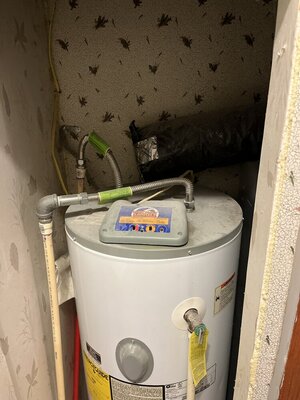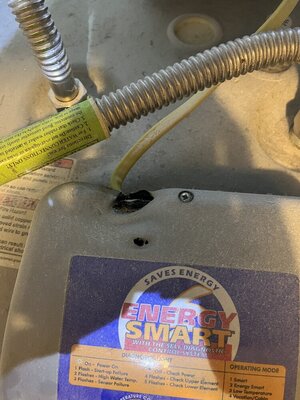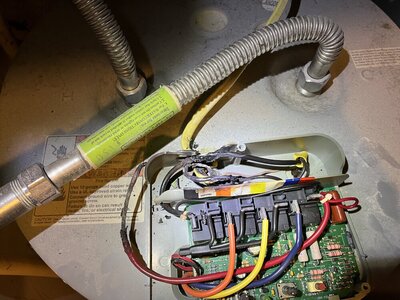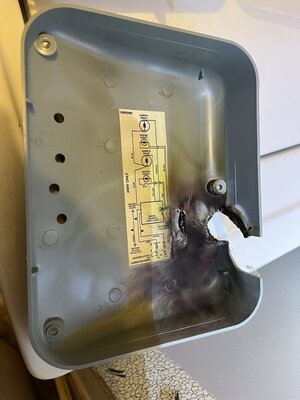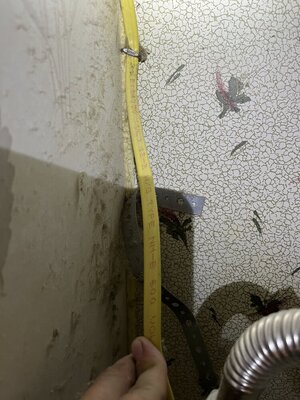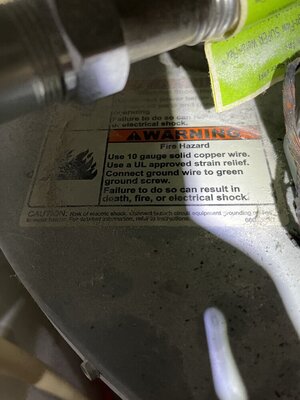So we were sitting here in the living room watching some tv and a very distinct smell started filling the house. Started investigating and found this……so I’ll be killing the power to that and addressing tomorrow after work
You are using an out of date browser. It may not display this or other websites correctly.
You should upgrade or use an alternative browser.
You should upgrade or use an alternative browser.
Almost had a bad night
- Thread starter 93redzj
- Start date
adamk
Well-Known Member
- Joined
- Nov 20, 2010
- Location
- Burlington
Glad you caught that early and nothing burned down.
justjeepin86
Well-Known Member
- Joined
- Jul 9, 2005
- Location
- Winston-Salem, NC
Man, glad you are safe.
- Joined
- Apr 16, 2005
- Location
- Sharon, SC
Glad you are safe!!!
Is that 12-2 ran to an electric WH?
Is that 12-2 ran to an electric WH?
skyhighZJ
Gov retirement < needs to live
- Joined
- May 31, 2012
- Location
- Aberdeen, NC.
Good catch but I’d say it’s not that “smart” if it didn’t catch that “oh fuck” in the making….
I’d sue ! Lol.
I’d sue ! Lol.
Probably, it’s a mobile home so not exactly up to “house” standards, at least that’s been my experience growing up. I know enough about electrical to not shock myself when working on it, luckily my dad is an electrician so I’ll have his guidance in remedying thisGlad you are safe!!!
Is that 12-2 ran to an electric WH?
It appears that it is a 12-2 wireGlad you are safe!!!
Is that 12-2 ran to an electric WH?
Attachments
mbalbritton
#@$%!
- Joined
- Mar 22, 2005
- Location
- Lakeland, FL
I have the same "Energy Smart" switch on my tank. guess what I'm going to go do right now?
something like this concerns me as my sense of smell is still screwed after Covid and burning plastics and things like that don't smell so familiar any more. I was walking through the house tracking down a smell yesterday that I couldn't place. Ends up it was coming from a pizza the kid was cooking/burning in the oven. I couldn't place it.
something like this concerns me as my sense of smell is still screwed after Covid and burning plastics and things like that don't smell so familiar any more. I was walking through the house tracking down a smell yesterday that I couldn't place. Ends up it was coming from a pizza the kid was cooking/burning in the oven. I couldn't place it.
- Joined
- Mar 24, 2005
- Location
- Stanley, NC
I'm no electurkal injuneer, but I wouldn't be too quick to worry about the switch. This looks more like insulation breakdown due to heat from excessive loading on undersized wiring. Everything on the switch seems to still be intact and in good shape.I have the same "Energy Smart" switch on my tank. guess what I'm going to go do right now?
I’m pretty sure my issue is gonna be on the house electrical side and not necessarily with the water heater or that smart energy thing….the water heater is a 4500w and currently on a 20amp circuit with 12g wire. The 4500w circuit at max load will pull around 23 amps which is overloading my current circuit, thus the reason my wires have melted.I have the same "Energy Smart" switch on my tank. guess what I'm going to go do right now?
something like this concerns me as my sense of smell is still screwed after Covid and burning plastics and things like that don't smell so familiar any more. I was walking through the house tracking down a smell yesterday that I couldn't place. Ends up it was coming from a pizza the kid was cooking/burning in the oven. I couldn't place it.
All this was installed before we purchased the house, although I very well could have made the same mistake out of pure ignorance. My electrician dad is the one who has educated me on the wattage and current draw limitations.
Bingo, overloading circuit.I'm no electurkal injuneer, but I wouldn't be too quick to worry about the switch. This looks more like insulation breakdown due to heat from excessive loading on undersized wiring. Everything on the switch seems to still be intact and in good shape.
View attachment 394828
- Joined
- Mar 24, 2005
- Location
- Stanley, NC
Whats the amperage on the breaker? Seems like it should have tripped.Bingo, overloading circuit.
With that said, I've melted the friggin 20 amp FUSE and 12 guage wire multiple times on the charging system of my side by side but it didn't melt the fusible link

It’s a 20amp breaker…..and it may or may not have tripped once or twice, but sporadically. Sooooo negligence on my part has played a role tooWhats the amperage on the breaker? Seems like it should have tripped.
With that said, I've melted the friggin 20 amp FUSE and 12 guage wire multiple times on the charging system of my side by side but it didn't melt the fusible link
View attachment 394829View attachment 394830
RatLabGuy
You look like a monkey and smell like one too
- Joined
- May 18, 2005
- Location
- Churchville, MD
The real disaster here is that wallpaper.
RatLabGuy
You look like a monkey and smell like one too
- Joined
- May 18, 2005
- Location
- Churchville, MD
If only they'd put a label on the thing tellinbg you what guage wire to use...I’m pretty sure my issue is gonna be on the house electrical side and not necessarily with the water heater or that smart energy thing….the water heater is a 4500w and currently on a 20amp circuit with 12g wire. The 4500w circuit at max load will pull around 23 amps which is overloading my current circuit, thus the reason my wires have melted.
All this was installed before we purchased the house, although I very well could have made the same mistake out of pure ignorance. My electrician dad is the one who has educated me on the wattage and current draw limitations.
- Joined
- Apr 16, 2005
- Location
- Sharon, SC
Most folks (not aimed at OP) don’t understand how a breaker works.If only they'd put a label on the thing tellinbg you what guage wire to use...
People think they work like fuses. 20q breaker at 22 amps it trips.
Not at all. There is a time current curve. A 20a breaker will likely carry even 25a for half an hour before it trips (depends on the make and model)…. So I’d bet whoever wired this up was sorta smart electrically and said “only have a 12 gauge wire let’s put in a 20a breaker that’ll protect the 12 awg.
That’s the designed pair…but combine the constant over load. The sporadic trip resets…the copper just yielded to heat strain and failed.
Sorta cool to see it play out especially since no one was hurt.
Now get a 10awg and a 30a breaker and rock on….
I’m actually opting to go with a 3800w water heater. The 12g and 20amp breaker should not be overloaded with that as at 125% capacity it’s at just over 19amps. 3800/240X1.25, puts me at 19.79 amps. The 4500w (current water heater) was operating above that 20amp capacity. 4500/240X1.25 give me 23.44 amps. This seemed to be the easier option than trying to run new wire.Most folks (not aimed at OP) don’t understand how a breaker works.
People think they work like fuses. 20q breaker at 22 amps it trips.
Not at all. There is a time current curve. A 20a breaker will likely carry even 25a for half an hour before it trips (depends on the make and model)…. So I’d bet whoever wired this up was sorta smart electrically and said “only have a 12 gauge wire let’s put in a 20a breaker that’ll protect the 12 awg.
That’s the designed pair…but combine the constant over load. The sporadic trip resets…the copper just yielded to heat strain and failed.
Sorta cool to see it play out especially since no one was hurt.
Now get a 10awg and a 30a breaker and rock on….
- Joined
- Apr 16, 2005
- Location
- Sharon, SC
Your home your call, buuuut.I’m actually opting to go with a 3800w water heater. The 12g and 20amp breaker should not be overloaded with that as at 125% capacity it’s at just over 19amps. 3800/240X1.25, puts me at 19.79 amps. The 4500w (current water heater) was operating above that 20amp capacity. 4500/240X1.25 give me 23.44 amps. This seemed to be the easier option than trying to run new wire.
- Breakers are not supposed to be loaded more than 80%. Almost all resi breakers are 80 rated - now that is a time value not a current value - but somehting like a WH that can run a long time can mess up the math.
- Make 100% certain you have a 240V service if possible. As voltage goes down amps go up. In many areas you will fall below the nominal voltage. Duke considers =/- 7% to be acceptable. So as low as 223 is considered ok.
- Also many areas are served with a 220V service not a 240V. (The math still works 3800/220 = 17)
- The fact that the wire failed where it did is likely because of the tight bend there - but that entire run of wire has been subjected to the same over load - very possible you have another compromised spot somewhere else that is already damaged. Even staying the same Id want to replace the wire either way - but I'm particular like that. YMMV
- Who wants a smaller weaker WH less hot water and longer to heat up.
- The cost of the breaker and the wire is certainly cheaper than the cost of the WH.
Not trying to sound like a know it all (though that's never stopped me before
 ) just giving my opinion.
) just giving my opinion.braxton357
Robot
- Joined
- Apr 6, 2005
- Location
- Morganton
Your home your call, buuuut.
- Breakers are not supposed to be loaded more than 80%. Almost all resi breakers are 80 rated - now that is a time value not a current value - but somehting like a WH that can run a long time can mess up the math.
- Make 100% certain you have a 240V service if possible. As voltage goes down amps go up. In many areas you will fall below the nominal voltage. Duke considers =/- 7% to be acceptable. So as low as 223 is considered ok.
- Also many areas are served with a 220V service not a 240V. (The math still works 3800/220 = 17)
- The fact that the wire failed where it did is likely because of the tight bend there - but that entire run of wire has been subjected to the same over load - very possible you have another compromised spot somewhere else that is already damaged. Even staying the same Id want to replace the wire either way - but I'm particular like that. YMMV
- Who wants a smaller weaker WH less hot water and longer to heat up.
- The cost of the breaker and the wire is certainly cheaper than the cost of the WH.
Not trying to sound like a know it all (though that's never stopped me before) just giving my opinion.
You're right on on all your suggestions but there is something that everyone I speak to gets wrong and it's that with resistive loads when voltage drops the watts also drop meaning so does amperage.
Using a #12 for the water heater is classic doublewide mfrs somehow get away with cutting corners on everything bullshit--that being said 12/2 would have no problem with 40 amps all day long, the problem was whoever put those wire nuts on didn't know what he was doing.
Yes sir, all valid points. I went the 3800w route out of time and ease of install. The current 12g wire runs up into ceiling and over to panel and most likely stapled along the stud inside the wall, which would just have made it more difficult to try and attach the 10g wire and pull through (in my opinion) but that’s not to say I can’t look at doing that in the near future and possibly even upgrade the elements to 4500w ones as well….the overall size of WH stayed the same 40gallonYour home your call, buuuut.
- Breakers are not supposed to be loaded more than 80%. Almost all resi breakers are 80 rated - now that is a time value not a current value - but somehting like a WH that can run a long time can mess up the math.
- Make 100% certain you have a 240V service if possible. As voltage goes down amps go up. In many areas you will fall below the nominal voltage. Duke considers =/- 7% to be acceptable. So as low as 223 is considered ok.
- Also many areas are served with a 220V service not a 240V. (The math still works 3800/220 = 17)
- The fact that the wire failed where it did is likely because of the tight bend there - but that entire run of wire has been subjected to the same over load - very possible you have another compromised spot somewhere else that is already damaged. Even staying the same Id want to replace the wire either way - but I'm particular like that. YMMV
- Who wants a smaller weaker WH less hot water and longer to heat up.
- The cost of the breaker and the wire is certainly cheaper than the cost of the WH.
Not trying to sound like a know it all (though that's never stopped me before) just giving my opinion.
RatLabGuy
You look like a monkey and smell like one too
- Joined
- May 18, 2005
- Location
- Churchville, MD
Just a thought for the future - many an electrician have just left the old wires in place and run new ones with their own chase...Yes sir, all valid points. I went the 3800w route out of time and ease of install. The current 12g wire runs up into ceiling and over to panel and most likely stapled along the stud inside the wall, which would just have made it more difficult to try and attach the 10g wire and pull through (in my opinion) but that’s not to say I can’t look at doing that in the near future and possibly even upgrade the elements to 4500w ones as well….the overall size of WH stayed the same 40gallon


